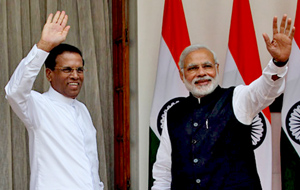New Delhi, Feb 16: Taking the ties to a new level, India and Sri Lanka today inked a civil nuclear pact besides deciding to expand defence and security cooperation.
This was announced after the talks between Prime Minister Narendra Modi and Sri Lankan President Maithripala Sirisena during which both the leaders expressed commitment to find a solution to the emotive fishermen issue by adopting a constructive and humanitarian approach.
"The bilateral agreement on civil nuclear cooperation is yet another demonstration of our mutual trust. This is the first such agreement Sri Lanka has signed. It opens new avenues for cooperation, including in areas like agriculture and healthcare," Modi said in a joint press interaction with Sirisena.
Sirisena, who arrived here yesterday, has chosen India for his first foreign trip after assuming charge of the country. He had dethroned Mahinda Rajapaksa from his 10-year rule after a bitter Presidential poll.
The nuclear pact would facilitate cooperation in the transfer and exchange of knowledge and expertise, sharing of resources, capacity building and training of personnel in peaceful uses of nuclear energy, including use of radioisotopes, nuclear safety, radiation safety and nuclear security.
It would also facilitate cooperation in radioactive waste management and nuclear and radiological disaster mitigation and environmental protection.
The two countries also signed three other pacts, including cooperation in the field of agriculture. Another MoU was signed to enable Sri Lanka to participate in the Nalanda University Project.
The Prime Minister said he and the Sri Lankan leader also agreed to expand the defence and security cooperation.
"We welcomed the progress in our maritime security cooperation, including in the trilateral format with the Maldives," he said.
Modi said he believed that destinies of both the countries are "inter-linked" and that "our security and prosperity are indivisible".
Modi said they had "excellent discussions" on bilateral relations and international issues and added that India was honoured that Sirisena had chosen the country for his first overseas destination after assuming charge.
On the fishermen issue, Modi said he and the President attached the "highest importance" to it.
"It affects livelihoods on both sides. We agreed that there must be a constructive and humanitarian approach to the issue.
"We will encourage the fishermen's associations on both sides to meet again soon. They should find a solution that can be taken forward by both governments," he said.
The Sri Lankan President expressed happiness over the outcome of the talks and said the friendship between the two countries was not only important to each other but was significant for the region as well.
"I really appreciate Prime Minister Modi's efforts (to improve ties). Relations between the two countries will be strengthened further," he said.
Modi also thanked Sirisena for inviting him to visit Sri Lanka and said he was "eagerly looking forward to visiting the country in March".
"We are at a moment of an unprecedented opportunity to take our bilateral relations to a new level. His visit today has set us firmly in that direction," the Prime Minister said while congratulating Sirisena for his historic victory in the recent elections in the island nation.
On the fishermen issue, Modi said fishermen's associations on both sides will be encouraged to meet again soon while noting that that they should find a solution that can be taken forward by both governments.
Modi said India was Sri Lanka's closest neighbour and friend and the goodwill and support of the people of India will always be with it.
"We also share a broad range of interests - economic development for our countries; peace and prosperity in South Asia; maritime security in the region," he said.
On the economic engagement, Modi said both the countries are committed to "unlock" the vast potential of the economic cooperation.
"We are pleased to be Sri Lanka's largest trading partner. I know that India enjoys a huge trade surplus. I expressed my support for a more balanced growth in trade in both directions," he said.
The Prime Minister said he had conveyed to Sirisena India's readiness to promote greater flow of Indian investments and tourists into Sri Lanka.
"We also intend to further improve air and sea connectivity between India and Sri Lanka," he said.
Modi said they discussed expansion of cooperation in energy sector, both conventional and renewable, and that Commerce Secretaries of both the countries will meet soon to review trade ties.
Talking about the Indian assisted projects for internally- displaced persons in Sri Lanka, Modi said they have made excellent progress.
"This includes the Housing Project, under which more than 27,000 houses have already been constructed. The President and I expressed satisfaction with the progress.
"I assured President Sirisena of India's commitment to its development partnership with Sri Lanka. This will continue to cover a broad range of areas, including infrastructure," he said.
Referring to a pact on cultural cooperation, Modi said that like cricket, culture provides a strong bond between the two countries.
"Sri Lankan nationals visit the National Museum in New Delhi in large numbers to pay homage to the Kapilavastu relics. We have decided to reduce the fees for them," he said.





Comments
Add new comment